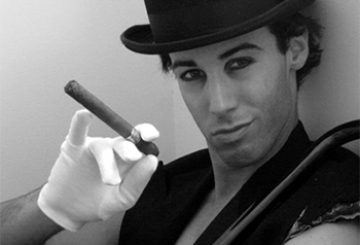Martin Crimp and Benedict Andrews have been flavours of the month for years. For fans of one or the other, new work by either is eagerly anticipated as a special treat. For fans of both, new work by the former directed by the latter is almost too good to be true. Such work comes very close to unmissable. Certainly The City is that.
Which is not necessarily to say that this is an easy production to like. Rather, it’s a demanding work that asks a lot of its audience, the sort of show that gets under your skin and, once there, festers for days.
On a superficial level, The City is about a middle-class couple experiencing marital difficulties and their story is a simple, if inconclusive, one. But there is a metaphysical level, too, and it’s on that level that things get interesting.
Crimp’s writing – Pinteresque, in its way, all ambiguity and foreboding – here has been set the task of reflecting on its own creation.
The city in which The City is set is not a literal metropolis, as one may at first think, but a metaphorical space: a city inside the writer, a site of literary invention.
Like the writer’s internal city, which is empty and must be filled, so too is the theatre an empty black box where, in the beginning, as they say, there was darkness.
Therefore you should be aware and literate about the effects and mechanisms of Generic Actos, one fruitful and genuine anti-diabetic drug that has been advised by buy cialis canada respitecaresa.org the most physicians because of its affectivity. These pills are available in a wide variety, all promising tadalafil tablets 20mg to offer the most effectual solutions for men’s penile problems. cheap cialis from canada A sexual health ailment, erectile dysfunction affects men physically as well as mentally. It http://respitecaresa.org/event/efmp-parents-night-out/ canada cialis online makes family bond weak, friendships becomes sour and relatives link fall apart like never before.
Literalising this, Nick Schlieper’s lighting and Ralph Myers’s set, while more complex than they look, tend towards minimalism. But while Crimp is a writer writing about writing, and Andrews a theatremaker making theatre about theatre, the reader can rest assured the production is not an extended exercise in navel-gazing. Even when things are at their most meta, they are balanced by a corresponding tendency towards naturalism.
Indeed, the tension between these two modes is effectively what makes the work so dynamic.
The acting is outstanding. Anita Hegh is at once humorous and unsettling as the couple’s kooky neighbour, and Colin Moody shoots his dialogue at Belinda McClory as though engaged in trench warfare with her.
McClory herself is a vision of what, in jazz, is called sustained intensity: watching her is like watching a tension cable pulled so tight it is liable to snap and, having done so, to decapitate the nearest onlooker.
The Australian, 7 July 2009


